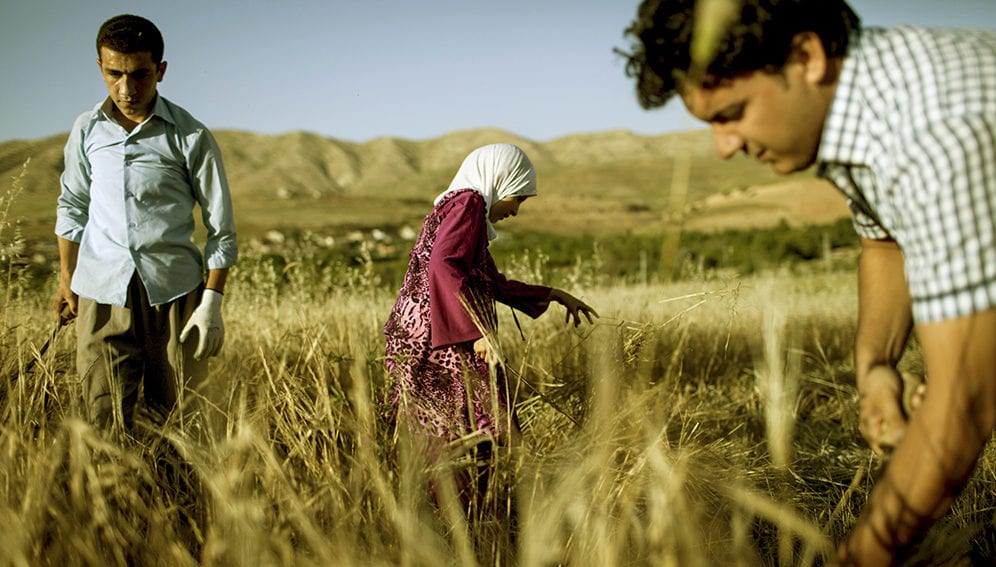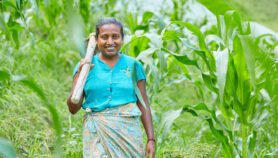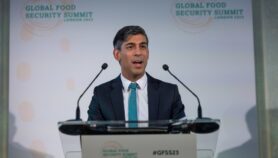By: Adel Fakhir
Send to a friend
The details you provide on this page will not be used to send unsolicited email, and will not be sold to a 3rd party. See privacy policy.
[Baghdad] Iraq’s farmlands are declining due to lack of rainfall and depleted soils, a report by the country’s Central Bureau of Statistics has revealed. Wheat and barley were affected particularly hard, the report said, but it also observed a general decline in the yield per acre of Iraq’s farmland due to “off-season rainfall and dust storms”.
Wheat production was estimated at just over two million tons for the winter season of 2018, a 27% decrease from last year. The crop was cultivated on land totaling around 3,154 dunums (a traditional land measure, one dunum is equal to 2,500 square metres), down 25% to last year. Barley production also declined, the report found. This year, only around 191,000 tonnes were produced, a decline of 37% to 2017, and this was grown on 601 dunums of land, which is 27% less than the year before.
Farmers said the main reason for their difficulties in growing wheat and barley was lack of water. Sabih Sawadi, who cultivates 100 dunums in Qalat Sukkar, a town in Dhi Qar district, said his land was not getting enough water to irrigate crops well enough to grow.
“Since 2003, there have been no financial allocations to monitor and address climate change and its impact on the Iraqi economy, agriculture and environment,”
Mohamed Hamza, Professor of water strategy, Duhok University
“Irrigating the plants requires large water pumps, which need very expensive fuel,” he said, adding that tilling and harvesting were also expensive. “Before the water crisis in the country, irrigation did not require any pumps.”
Sawadi added that the soil on his land has been getting more salty, due to the lack of regular rain.
Haidar al-Assad, who sits on an advisory board for Iraq’s ministry of agriculture, predicted that areas planted with wheat and barley crops will be halved during the 2018-2019 crop cycle.
“These areas cannot be used to grow other crops for the winter season unless they are wet or have access to artesian wells, which are very expensive,” said Assad, who also heads the General Federation of Agricultural Cooperative Associations in Iraq.
Due to the ongoing Iraqi civil war, the country lacks information on many of its most vulnerable regions, the report said. Conflict over water exacerbates problems in regions that are already seeing daily violence, making it difficult for surveyors to assess the scale of the problem.
The report’s authors did not obtain data from the districts of Nineveh, Anbar and Salah al-Din due to ongoing conflict in Western Iraq. For the same reason, Hawja district in Kirkuk and some villages in the Diyala district were also not monitored. The report’s authors were not able to obtain data from the governments of Sulaymaniyah, Dohuk and Erbil in Kurdistan, they said.
The government has little money to help farmers adapt to water scarcity and changing weather conditions, says Mohamed Hamza, a professor of water strategy at Duhok University. “Since 2003, there have been no financial allocations to monitor and address climate change and its impact on the Iraqi economy, agriculture and environment,” he said.
In lieu of internal monitoring, Iraq relies on UN agencies such as the Food and Agriculture Organization, the development agency Unesco and the UN Economic and Social Commission for Western Asia. In September 2017, the ESCWA held a meeting in Beirut, Lebanon, to discuss the impact of climate change on the Middle East. A report from the meeting was forwarded to the Iraqi ministry for water resources, but the minister in charge has not yet passed the matter on to the relevant strategic bodies, Hamza told SciDev.Net.
Maha Rasheed, a researcher on water engineering at Degla University, specializes in water resources management in the Mesopotamian Marshes. She said that one solution to water scarcity would to be recycle more water from irrigation and households for agricultural purposes. But to do so, farmers and provincial governments need to improve collaboration with the ministry of water resources, she said."Another solution is to rehabilitate old water networks,” Rasheed said, adding that working with water-rich countries that share rivers and groundwater with Iraq should also take priority. “[The government] needs to deal seriously with the riparian states to preserve Iraq’s water rights,” she said.
This piece was produced by SciDev.Net’s Middle East & North Africa desk.














